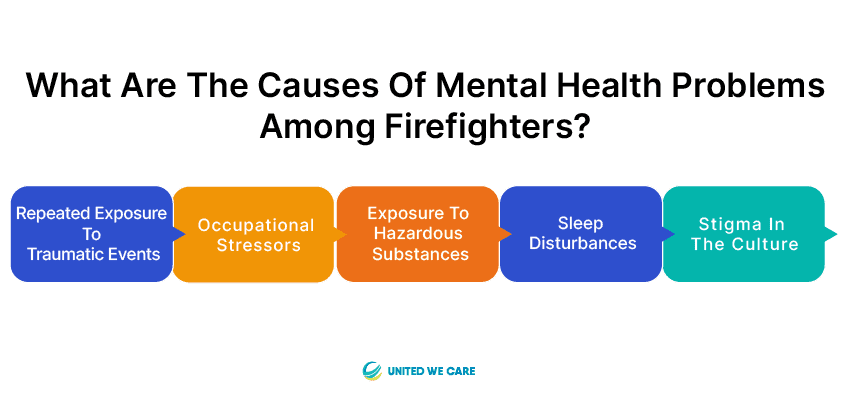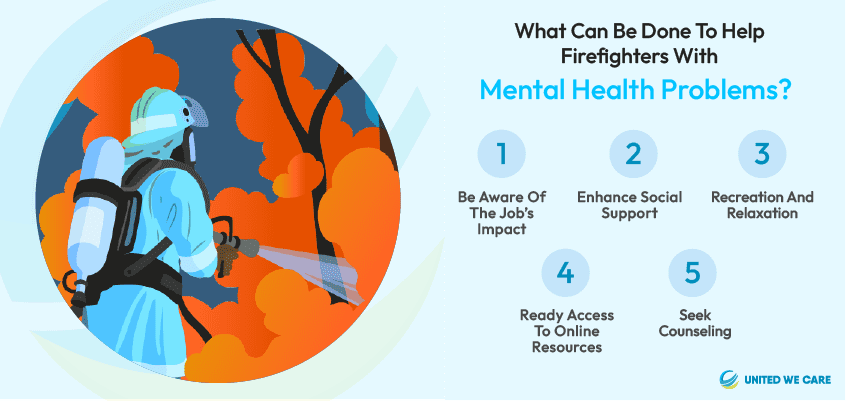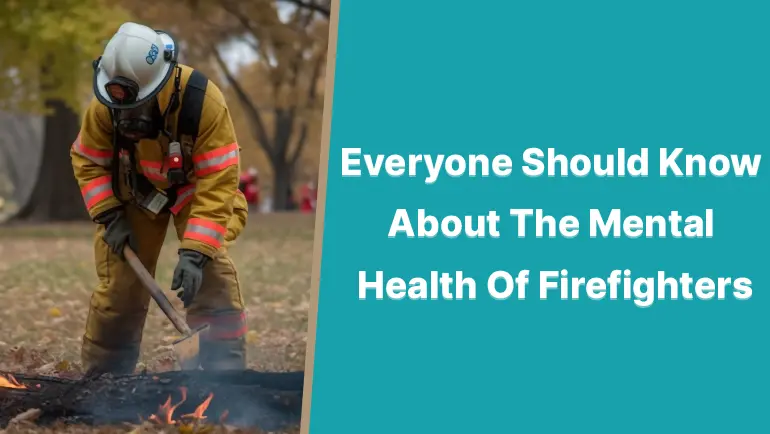Introduction
Firefighters are brave men and women who fearlessly rush into burning buildings to save lives and property. While their heroic acts are commendable, it is essential to recognize the mental health challenges they face. The demanding nature of their work, exposure to traumatic incidents, and the cumulative effects of stress can significantly impact their mental well-being. This article explores the mental health concerns of firefighters, shedding light on the importance of addressing these issues and providing support.
What are the Causes of Mental Health Problems Among Firefighters?
Firefighting is a high-stress profession that requires employees to put themselves in contact with dangerous situations that may potentially be traumatic. Apart from that, the nature of the job is demanding, and the job culture may be ill-equipped to support firefighters. Some of the most common reasons firefighters face mental health issues are as follows.

Repeated Exposure to Traumatic Events
Firefighters frequently encounter traumatic events and critical incidents that can have a profound psychological impact. These events may involve witnessing death, severe injuries, or the loss of colleagues and civilians [1] [2] [3]. Being exposed to such traumatic events increases the chances of developing PTSD along with conditions like depression, anxiety, or substance abuse [4].
Occupational Stressors
Apart from being exposed to threatening situations, firefighters are engaged in hazardous work activities that include tasks with the risk of injuries, lengthy shifts lasting 24 hours, sudden transitions from periods of rest to emergency responses, and working in unstable and unfamiliar environments [2] [3]. This can lead to a high physical and mental health risk.
Exposure to Hazardous Substances
Firefighters’ job puts them at risk of exposure to harmful chemical substances. Recent studies establish a link between prolonged exposure to fire outputs like soot and reporting of mental health problems [5]. The study also found that those in their PPE kits longer or perceived remnants of the fire, like the smell of smoke or the presence of soot on their bodies after the fire, were more likely to report mental health disturbances [5].
Sleep Disturbances
Most firefighters have reported sleeping problems given that they work in shifts and they might need to respond to emergencies [5]. Not getting enough sleep not only affects mental health but also impacts performance, and it can compromise the safety of firefighters by reducing their reaction times. Furthermore, chronic sleep problems can adversely affect the immune system, cardiovascular health, and gastrointestinal well-being [5].
Stigma in the Culture
The stigma surrounding mental health is a significant barrier to seeking help and support among firefighters. First responders prioritize toughness, resilience, and self-reliance in their careers and often fear appearing weak, so many firefighters do not seek help [3] [4].
Firefighters face dangerous situations and are also responsible for crucial rescue work. Given the factors mentioned above, they are at high risk for developing mental health issues.
What Are The Symptoms of Mental Health Problems Among Firefighters?
As mentioned above, firefighters are at grave risk of developing mental health conditions, given their work’s stressful and unpredictable nature. A great deal of research provides veracity to this relation. The following are commonly found mental health issues in firefighters [2] [4] [6] [7] [8] [9].
- Post-Traumatic Stress Disorder
- Depression (especially Major Depressive Disorder)
- Anxiety Disorders
- Sleep Disturbances
- Suicidal ideation, plans, and attempts
- Non-suicidal Self Harm
- Chronic Fatigue
- Burnout
- Psychological Distress
- Alcoholism
- Gambling
Along with the above-mentioned mental health concerns, firefighters are also at an elevated risk of cardiovascular disease, musculoskeletal, neurological, and respiratory problems [4]. Further, researchers have found a significant relationship between the number of fatal events attended and rates of PTSD, depression, and drinking [6]. There is also a link between the severity and duration of disaster exposure and the development of PTSD and depression [8]. Thus, as the duration of service increases, the risk of the disorders mentioned above and chronic fatigue increases [2]. Retired professionals report more symptoms than those in service [6].
Read this article –A Guide to Acute Stress Disorder
What Can be Done to Help Firefighters with Mental Health Problems?
The impact of the firefighting profession on mental health is concerning and significant. Some countries have made changes to reduce this impact through interventions like Critical Incident Stress Debriefing, but there is no conclusive proof of its success [10]. However, individuals can take certain steps to minimize the negative impact on a personal level. These include:

Be aware of the Job’s Impact
Many professionals may ignore signs and symptoms of disorders like depression, anxiety, or PTSD as simple stress. Thus, firefighters must become aware of the job’s impact on their minds and body and what this impact looks like. Awareness helps in overcoming stigma and taking timely action.
Enhance Social Support
Social support is an essential tool that can significantly reduce the impact of adverse events on the mind and body. Researchers have found that firefighters with less support are more likely to feel depressed and experience traumatic stress [11], and those who spend time talking about work or stress with co-workers have lesser mental health issues [12].
Recreation and Relaxation
Engaging in activities outside of work that promote relaxation, rest, and help in recreation are useful for firefighters [12] [13]. These activities include hobbies, meditation, reading, time off, and spending time with family.
Ready Access to Online Resources
Many organizations are working actively to improve access to help for firefighters. For instance, initiatives like the “Code Green Program” [14] and the “Share the Load” program [15] have compiled resources and helplines for the help of firefighters. They also offer training and information on managing these concerns and emergency helplines. Ready access to these services can shorten the time spent in distress.
Seek Counseling
At times self-help may not be enough. Especially when a firefighter is struggling with PTSD, depression, anxiety, or experiencing recurring thoughts of suicide and self-harm, it is essential to seek professional help. Counseling can help in managing these symptoms and developing positive coping strategies.
Conclusion
The mental health of firefighters is a critical aspect that requires intervention both at a policy and a personal level. They face significant stressors and traumatic experiences in the line of duty, leading to a heightened risk of mental health challenges. At a personal level, social support, relaxation activities, access to resources, and counseling can help firefighters deal with the impact of their job.
If you are a firefighter or know someone who is struggling with mental health issues, contact the experts at United We Care. The team at United We Care is committed to providing you with the best resources for your overall well-being.
References
- C. C. Johnson et al., “Enhancing mental health treatment for the firefighter population: Understanding fire culture, treatment barriers, practice implications, and research directions.,” Professional Psychology: Research and Practice, vol. 51, no. 3, pp. 304–311, 2020. doi:10.1037/pro0000266
- V. Vargas de Barros, L. F. Martins, R. Saitz, R. R. Bastos, and T. M. Ronzani, “Mental health conditions, individual and job characteristics and sleep disturbances among firefighters,” Journal of Health Psychology, vol. 18, no. 3, pp. 350–358, 2012. doi:10.1177/1359105312443402
- J. C. MacDermid, M. Lomotan, and M. A. Hu, “Canadian career firefighters’ mental health impacts and priorities,” International Journal of Environmental Research and Public Health, vol. 18, no. 23, p. 12666, 2021. doi:10.3390/ijerph182312666
- K. E. Klimley, V. B. Van Hasselt, and A. M. Stripling, “Posttraumatic stress disorder in police, firefighters, and emergency dispatchers,” Aggression and Violent Behavior, vol. 43, pp. 33–44, 2018. doi:10.1016/j.avb.2018.08.005
- T. A. Wolffe, A. Robinson, A. Clinton, L. Turrell, and A. A. Stec, “Mental health of UK firefighters,” Scientific Reports, vol. 13, no. 1, 2023. doi:10.1038/s41598-022-24834-x
- S. B. Harvey et al., “The Mental Health of Fire-fighters: An examination of the impact of repeated trauma exposure,” Australian & New Zealand Journal of Psychiatry, vol. 50, no. 7, pp. 649–658, 2015. doi:10.1177/0004867415615217
- S. Cowlishaw et al., “Prevalence and implications of gambling problems among firefighters,” Addictive Behaviors, vol. 105, p. 106326, 2020. doi:10.1016/j.addbeh.2020.106326
- S. L. Wagner et al., “Mental disorders in firefighters following large-scale disaster,” Disaster Medicine and Public Health Preparedness, vol. 15, no. 4, pp. 504–517, 2020. doi:10.1017/dmp.2020.61
- I. H. Stanley, M. A. Hom, C. R. Hagan, and T. E. Joiner, “Career prevalence and correlates of suicidal thoughts and behaviors among firefighters,” Journal of Affective Disorders, vol. 187, pp. 163–171, 2015. doi:10.1016/j.jad.2015.08.007
- M. B. Harris, M. Baloğlu, and J. R. Stacks, “Mental health of trauma-exposed firefighters and critical incident stress debriefing,” Journal of Loss and Trauma, vol. 7, no. 3, pp. 223–238, 2002. doi:10.1080/10811440290057639
- C. Regehr, J. Hill, T. Knott, and B. Sault, “Social support, self-efficacy and trauma in new recruits and experienced firefighters,” Stress and Health, vol. 19, no. 4, pp. 189–193, 2003. doi:10.1002/smi.974
- G. Sawhney, K. S. Jennings, T. W. Britt, and M. T. Sliter, “Occupational stress and mental health symptoms: Examining the moderating effect of work recovery strategies in firefighters.,” Journal of Occupational Health Psychology, vol. 23, no. 3, pp. 443–456, 2018. doi:10.1037/ocp0000091
- Implementation Toolkit – National Volunteer Fire Council, https://www.nvfc.org/wp-content/uploads/2021/01/PHFD-Implementation-Toolkit.pdf (accessed Jun. 3, 2023).
- “Help & Resources,” The Code Green Campaign, https://www.codegreencampaign.org/resources/ (accessed Jun. 3, 2023).
- “Share the load,” National Volunteer Fire Council, https://www.nvfc.org/programs/share-the-load-program/ (accessed Jun. 3, 2023).





